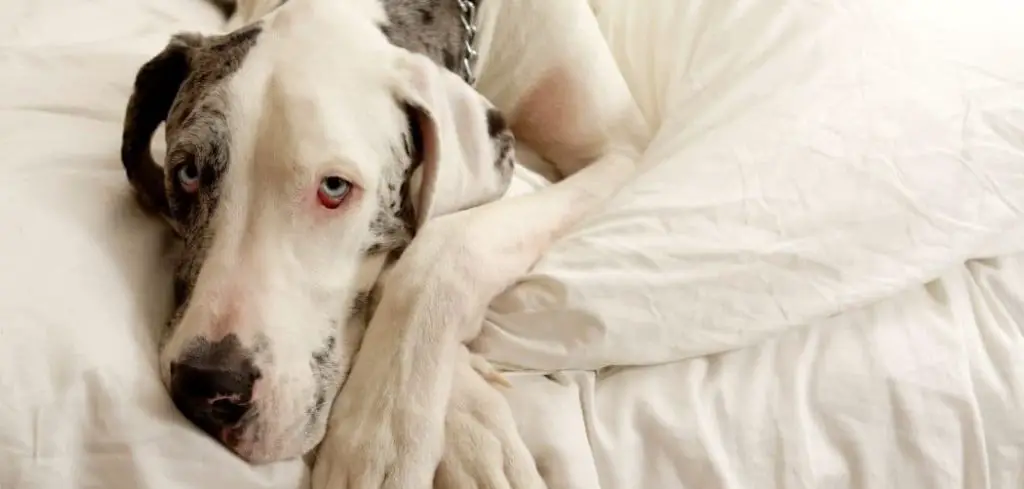Dogs often lick themselves as part of normal grooming, but when licking becomes constant or is paired with coughing, it’s a sign that something more serious may be happening.
These two symptoms together can be unsettling for dog owners, as they may indicate an underlying medical issue.
We outline the common reasons why a dog may excessively lick and cough, what you can do at home, and when to seek veterinary help.
Dog Excessive Licking and Coughing — Why It Happens
Excessive licking and coughing in dogs are often connected to irritation, allergies, respiratory problems, or underlying health conditions. Dogs may lick themselves due to skin irritation, infections, or anxiety, while coughing can be triggered by respiratory infections, foreign objects, or heart disease.
When the two symptoms occur together, it often points to an issue that is irritating both the airways and the dog’s overall comfort.
Allergies, infections, or even something lodged in the throat can cause a dog to lick excessively and cough.

Dog Excessive Licking and Coughing: Common Causes
Allergies
Allergies are one of the most common reasons for both licking and coughing. Environmental allergens like pollen, dust, and mold can irritate the skin and airways.
Dogs often respond by licking themselves excessively, especially their paws, to relieve the itching. At the same time, inhaled allergens can cause inflammation in the respiratory tract, leading to coughing.
Allergic dogs may also have watery eyes, sneezing, or red skin. If left untreated, allergies can become chronic, leaving a dog miserable and at higher risk for secondary infections.
Read more: Dog Excessive Licking and Gulping (What it could mean)
Respiratory Infections
Respiratory infections such as kennel cough or canine influenza can cause persistent coughing. Along with coughing, dogs may lick their lips and paws more often due to the discomfort and mucus associated with infection.
These infections spread easily in social environments like boarding kennels, dog parks, and grooming facilities. Symptoms can include lethargy, nasal discharge, and a hacking cough that may sound like gagging. While mild cases sometimes improve with rest, infections can escalate quickly and require veterinary treatment.
Foreign Object in the Throat
Sometimes a dog coughs and licks excessively because something is stuck in its throat or mouth. This could be a piece of grass, a bone splinter, or even a small toy part. Dogs often lick their lips repeatedly while trying to dislodge the item, and coughing follows as the body’s attempt to clear the obstruction.
This situation can become an emergency if the object fully blocks the airway. In such cases, the dog may show signs of distress, drooling, gagging, or pawing at the mouth.
Gastroesophageal Reflux (Acid Reflux)
Acid reflux can cause a dog to lick excessively as a way of coping with nausea or the burning sensation in the throat. Coughing may also occur when stomach acid irritates the esophagus and airway. This condition is uncomfortable and often worsens at night or after meals.
Other signs may include burping, swallowing more than usual, or refusing food. While some mild cases can be managed with diet changes, persistent reflux needs veterinary evaluation.
Heart Disease
Heart disease in dogs can cause coughing because of fluid buildup around the lungs or pressure on the airway. Dogs with heart issues may also lick excessively due to restlessness, discomfort, or nausea related to poor circulation.
This type of coughing often worsens at night or after exercise. Affected dogs may also tire easily, breathe heavily, or collapse. Because untreated heart disease can be life-threatening, prompt veterinary care is essential.
Anxiety and Stress
Anxiety can cause dogs to lick excessively as a self-soothing behavior. Coughing may appear in stressed dogs due to tension in the throat or aggravation of existing health conditions. Triggers may include loud noises, changes in routine, or separation from family.
Dogs with anxiety may also pace, whine, or tremble. If stress is the underlying cause, addressing emotional health is just as important as treating the physical symptoms.
Read more: Dog Excessively Coughing (When to worry)
What to Do If Your Dog Is Excessively Licking and Coughing
If a dog is licking and coughing excessively, start by observing when and how the symptoms occur. Note whether they appear after eating, during exercise, or at night, as this helps your veterinarian narrow down the cause.
At home, you can provide relief by keeping your dog in a clean, dust-free environment to reduce allergens.
Offering fresh water can soothe irritation, and switching to a bland, vet-approved diet may help if digestive issues are suspected. Bathing with gentle, hypoallergenic shampoos may ease skin irritation and reduce licking.
Minimize stressful situations for anxious dogs by providing a calm environment and enrichment activities. However, if symptoms persist for more than a few days, or worsen, veterinary guidance is essential.
When to Call or Visit Your Vet
Seek immediate veterinary help if your dog’s coughing is harsh, persistent, or sounds like choking. Difficulty breathing, blue gums, or collapse are emergencies requiring urgent care.
A veterinary visit is also necessary if licking causes raw skin, infections, or hair loss. Chronic symptoms, weight loss, or reduced appetite point to underlying issues that need professional diagnosis.
Because causes range from mild allergies to serious conditions like heart disease, it is always better to err on the side of caution and consult a veterinarian.
Read more: Dog licking excessively (Discover what it might mean)
Key Takeaway
Excessive licking and coughing in dogs are not just quirky behaviors — they are important signs that something may be wrong. From allergies and infections to heart disease or anxiety, the causes vary, but each deserves careful attention.
By monitoring when the symptoms happen, providing comfort at home, and knowing when to seek veterinary help, dog owners can ensure their pets stay safe and healthy. A caring, timely response can make all the difference in a dog’s quality of life.
